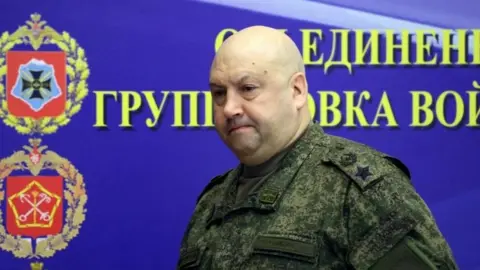Ukraine war: Wagner-linked senior general Sergei Surovikin 'resting'
 Reuters
ReutersA former Russian commander who has not been seen in public since the Wagner mutiny in June is "resting", according to a senior MP in Moscow's parliament.
Andrei Kartapolov, chair of the defence committee, said Gen Sergei Surovikin was "not reachable", fuelling speculation about his whereabouts.
Unconfirmed reports say Gen Surovikin has been held for questioning about his alleged involvement in the mutiny.
He is said to enjoy close relations with Wagner boss Yevgeny Prigozhin.
Wagner's mercenaries attempted a brief mutiny on 23 and 24 June, threatening to march on Moscow.
The mutiny ended after the intervention of Belarusian President Alexander Lukashenko, who apparently made a deal with Prigozhin.
Wagner's troops have been told they can either join the Russian armed forces, go home or go to serve in Belarus.
On Wednesday the Russian defence ministry said the group was completing the process of handing over weapons and military equipment, surrendering more than 2,000 items including tanks, rocket launch systems, anti-aircraft guns and artillery.
It published video of the hardware, along with large quantities of small arms and ammunition.
There has been no independent confirmation that the supplies came from Wagner.
'General Armageddon'
Gen Surovikin was last seen in public in a video during the mutiny urging the Wagner forces to call a halt to their action.
Media reports days later said he had been arrested, but there has been no official confirmation of his whereabouts.
A blogger close to the Russian military said on Monday there were unconfirmed reports that the general was in the notorious Moscow prison Matrosskaya Tishina. He added that the only thing that was certain was that Gen Surovikin "has not been home".
However, on Thursday Moscow city official Alexei Melnikov said he had visited the prison and two other jails in the capital and Gen Surovikin was not in any of them.
The general was put in charge of Russian forces in Ukraine in October but removed three months later.
He gained a reputation for brutality during Russian operations in Syria, where he became known as "General Armageddon".
In Ukraine he oversaw devastating attacks on energy infrastructure, leaving millions of civilians without power or water over the winter.
He was replaced in January by Chief of Staff Gen Valery Gerasimov, becoming his deputy.
